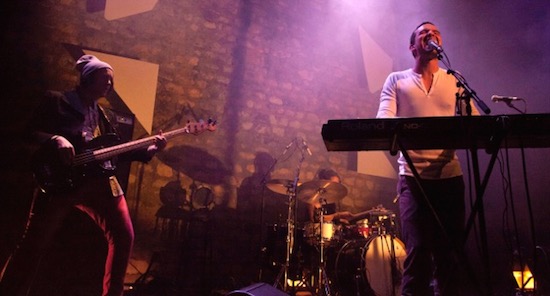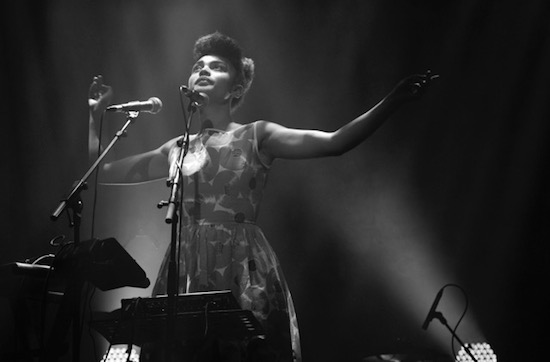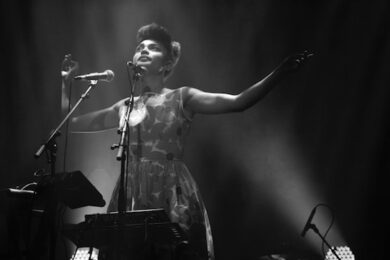"The old Paris is no more", wrote Baudelaire, except in French, obviously. "The form of a city changes more quickly, alas, than the human heart." Yet despite flecks of gentrification, this city retains a strength of personality which London is all too giddily jettisoning in the pursuit of appeasing the modern-day covert and faceless Louis Quatorzes of the world.
At the Café De La Danse in bustling bohemian Bastille, which as far as this old roue can discern is the current "happening" area of Paris, the elegantly eclectic No Format! indie label is celebrating its first decade of existence. En route to the venue, one passes record shops named Le Silence De La Rue and Music Fear Satan. Nearby, gothic ravens flit between the tombstones of Oscar Wilde and Edith Piaf in Pere Lachaise cemetery.
The event is very much alive, as is No Format! at the age of ten. A range of acts from many countries perform, offering sounds striding from fresh nuances of folk to that broadest of terms "world music", and on to classical, funk, soul and hip-hop, with confidence and verve which makes a nonsense of such categories. It confirms the company’s motto that "you never know in advance what you’ll fall in love with". Certainly it’s hard not to be wooed by the high degrees of taste when golden-voiced West Londoner Ala.ni elects to cover Jimmy Webb’s ‘Wichita Lineman’, or Brooklyn’s bright young thing Gabriel Garzon-Montano breezes through Prince’s ‘If I Was Your Girlfriend’. Four nights of shows – I catch the last two – establish that in a time of obvious challenges for small labels, this one is flourishing through a blend of old-fashioned values like imagination and curatorial care and a contemporary awareness that the modern musical world is a global mash-up rather than a local concern. And that the elements worth embracing are the artistic rather than the financial.
Says founder Laurent Bizot: "Yes, it’s about globalisation, not nationality. But not in the sad way of that word. In the joyful, more innovative way. Making things richer, not poorer."
The dated clichés we ignorant Brits grew up with – of chansonneurs, of Piaf and Johnny Hallyday and Sacha Distel – seem risible to the French generation now moving and shaking the music industry there. Even Gainsbourg’s oeuvre is tolerated for being rebellious, rather than venerated as a template. Bizot points out that French commercial music for many years had a tradition of being very much focussed on the lyrics, on story-tellers (thus rendering them "difficult" for English-speaking audiences): in a post-Air/Daft Punk/Laurent Garnier/Phoenix/Justice/don’t-mention-David-Guetta era, those days are pretty much gone.
Not that No Format! is in any way "typically" French, apart from the occasional Gallic shrug. Neither is it overtly commercial, though it ticks over nicely. When Bizot, a producer, began the label in 2004, he was fed up with the misguided wastefulness of the majors he’d worked for. His mission was to prove that instead of throwing so many records at the wall that one of them might eventually stick, you could succeed with smaller budgets, and if the ideas were good enough, not lose money on any of them. Adventurous "difficult" music from across the planet could, he insisted, be packaged with style and a stoic faith that – if I may bastardise the Costner classic Field Of Dreams – if you build it they will come. Attention to detail is key. Designer Jerome Witz – inspired by Blue Note, 4AD, Factory – gives each release a graphic identity that makes them desirable physical objects. As Godard said, style and content go together, they can’t be separated.
Even a curious collaboration between, say, a French cellist, Vincent Segal, and a Malian kora player, Ballake Sissoko, titled Chamber Music, sold over 50,000 copies. Duets between representatives of different continents abound. Yet for Bizot it’s about holding your nerve and staying consistent, rather than craning your neck for the elusive freak crossover hit. He cites the label’s subscription systems, whereby believers can buy an annual pass for all releases or gigs; a kind of season ticket, requiring a leap of faith. That No Format! inspires such blind devotion is a testament to its tactics and triumphs. Bizot compares it to "a corner-shop economy – modest but sane and healthy." The name was a reaction to corporate homogenisation. A sibling spin-off, Prospect, helmed by Thibaut Mullings, who joined Bizot in 2007, launches this week too, focusing on younger artists.
Things could have turned out differently. Fortune smiled on Laurent when in 2005 Gonzales, the Canadian electro maverick, delivered a piano instrumental album which sold 100,000 and got No Format! off to a flying start. There followed a diverse string of sonics, from the rap of Roce to the lounge groove of Nicolas Repac, from the Malian whirl of Kasse Mady Diabate to the free jazz of Dogme De Six Jours. This week’s shows sees quite the multi-cultural (for want of a less cringe-inducing term) mix. Bizot compares it to a "manege", which strictly speaking translates as an exercise in dressage at a riding academy, but which we agree to convey best as "carousel".

In this first foggy week of December, Monday night gave the assembled the pairing of Piers Faccini and Vincent Segal, and Tuesday offered Kasse Mady Diabate. The former, who recently played at the Royal Festival Hall as part of the London Jazz Festival, have Faccini singing softly in various languages over guitar and cello, earning comparisons, mood-wise, to Nick Drake. Their new album Songs Of Time Lost (how Proustian!) includes interpretations of Townes Van Zandt and Friedrich Hollander pieces. Diabate (who also played the Purcell Room) has been hailed by Salif Keita as Mali’s greatest singer. Intimate, understated new album Kirike (which translates as horse’s saddle) is another of the label’s recent releases.
As I arrive on Wednesday night, British singer Ala.ni (who has worked with Mary J. Blige, Damon Albarn and Andrea Bocelli, and releases her own debut in the new year) is holding the French rapt with her liquid, smoky-night-club voice, which calls to mind Sade and Anita Baker and, er, someone more modern. Diplomatically, she psalms the praises of Paris, professing that it’s kept its character while London becomes more and more Americanised, its historic music venues bulldozed for luxury flats. I’m inclined to agree, but then "Wichita Lineman" always renders me malleable.
Lucas Santtana is shaking up Brazilian pop, lacing the tropes with dashes of electronica, loops and free-thinking energy. His band have suffered a major stressful equipment-loss mishap today, so it’s impressive that they sound so colourful improvising that we don’t know this until someone tells us afterwards. Already making inroads in the UK, the next morning he’s off to a gig in Luxembourg, he tells me, while comparing the footballing merits of Flamengo and Liverpool.
Thursday night opens with New Zealander Estere, a young soloist in a vintage dress with keyboard, tapes and a rich vocal tone. Lorde springs to mind, but that rather spoils the primary notion of blowing glib nationality out of the pond. She’s a bit too jolly and chirpy to be Lorde, perhaps more Lily Allen, though when she sings in French hidden depths trickle through. My subjective favourite set of the shows, by a mile, comes from Gabriel Garzon-Montano, a Brooklyn-based French-Colombian soul-funk man who updates that floating, smooth, airy D’Angelo/Maxwell sound with dashes of hip-hop (there’s a Kendrick Lamar sample in one track). He’s currently supporting Lenny Kravitz on a worldwide stadium tour, and his confidence is exemplified when he leaves the stage to join the audience and sing amongst them. From the lineage of Marvin and Curtis but evidently raised on Prince and Justin Timberlake, Garzon-Montano has a fabulous voice, songs which echo Donnie Hathaway, and a persona which already reckons it’s a star. He plays everything on his records, though here his band are insanely tight and dance-worthy. He may not be reinventing the wheel, but his polished grooves, which someone somewhere is currently describing as "urban", are irresistible.
Similarly, No Format! may not be storming the Bastille with anything revolutionary, but their evident enthusiasm for mixing and matching and channelling our cross-fertilising culture is a cause to be complimented, giving a kiss of life to an industry that often seems more wheezily out of breath than romantically breathless.
<div class="fb-comments" data-href="http://thequietus.com/articles/16900-live-report-review-10-years-of-no-format” data-width="550">



